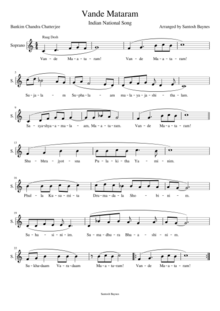वन्दे मातरम्
 बङ्किमचन्द्र चट्टोपाध्यायद्वारा लिखित वन्दे मातरम् राग। | |
भारतको राष्ट्रिय गान | |
| लेखक | बङ्किमचन्द्र चट्टोपाध्याय, आनन्दमठ (सन् १८८२) |
|---|---|
| सङ्गीत | हेमन्त मुखोपाध्याय, जदुनाथ भट्टाचार्य (मूल रचना सरलादेवी चौधुराणीको थियो) |
| लागू | सन् १९५० जनवरी २४ |
वन्दे मातरम् (संस्कृत: वन्दे मातरम् , अनुवाद: 'माता, म तिमीलाई नमन गर्छु') बङ्किमचन्द्र चटर्जीद्वारा सन् १८७० मा बङ्गाली भाषामा लेखिएको एक कविता हो, जसलाई उनले आफ्नो सन् १८८२ बङ्गाली उपन्यास 'आनन्दमठ'मा समावेश गरेका थिए।[१][२][३] यो कविता पहिलो पटक रवीन्द्रनाथ ठाकुरले सन् १८९६ को भारतीय राष्ट्रिय काङ्ग्रेसको अधिवेशनमा गाएका थिए।[४] सन् १९४७ अगस्टमा औपनिवेशिक शासनको अन्त्य हुनु अघि काङ्ग्रेस कार्य समितिले सन् १९३७ अक्टोबरमा गीतका पहिलो दुई श्लोकलाई भारतको राष्ट्रिय गीतको रूपमा ग्रहण गरेको थियो।[५]
मातृभूमिको एक श्रद्धोक्ति, यो उपन्यास 'आनन्दमठ'मा बङ्गाली लिपिमा लेखिएको थियो।[६] 'वन्दे मातरम्' शीर्षकको अर्थ "म मातृभूमिको प्रशंसा गर्छु, माता"।[७][८] गीतको पछिल्ला पदहरूमा "माता देवी" लाई जनताको मातृभूमिको रूपमा व्याख्या गरिएको छ - बङ्ग जननी (वङ्ग माता/বঙ্গ মাতা)[९][१०][११][१२] र भारत माता (भारत माता)[१३][१४][१५] यद्यपि पाठमा यो स्पष्ट रूपमा उल्लेख गरिएको छैन।
यो गीतले भारतीय स्वतन्त्रता सङ्ग्राममा महत्त्वपूर्ण भूमिका खेलेको थियो, पहिलो पटक रवीन्द्रनाथ ठाकुरले सन् १८९६ को भारतीय राष्ट्रिय काङ्ग्रेसको अधिवेशनमा राजनीतिक सन्दर्भमा यो गीत गाएका थिए।[१६] यो सन् १९०५ मा राजनीतिक सक्रियता र भारतीय स्वतन्त्रता आन्दोलनको लागि एक लोकप्रिय[७] गीत बनेको थियो। आध्यात्मिक भारतीय राष्ट्रवादी र दार्शनिक अरविन्दोले यसलाई "बङ्गालको राष्ट्रिय गान" भनेर उल्लेख गरेका थिए।[१७] उक्त गीत र उपन्यासलाई औपनिवेशिक सरकारले प्रतिबन्ध लगाए कामदार र आम जनताले प्रतिबन्धको अवहेलना गरे (जनताहरूको बिचमा यो गीत गाएको कारणले धेरैलाई बारम्बार जेल हालियो); भारतले सन् १९४७ मा औपनिवेशिक शासनबाट स्वतन्त्रता प्राप्त गरेपछि भारत सरकारले उक्त प्रतिबन्धलाई खारेज गरेको थियो।[१८][१९]
सन् १९५० जनवरी २४ मा भारतको संविधान सभाले "वन्दे मातरम्" लाई राष्ट्रिय गीतको रूपमा स्वीकार गरेको थियो। सो अवसरमा भारतका प्रथम राष्ट्रपति राजेन्द्र प्रसादले गीतलाई भारतको राष्ट्रिय गान ‘जन गण मन’को बराबरीमा सम्मान गर्नुपर्ने बताएका थिए।[२०] यद्यपि भारतको संविधानमा "राष्ट्रिय गीत" को कुनै उल्लेख छैन। [२१] [२२]
गीतका पहिलो दुई पदहरू माता र मातृभूमिको अमूर्त सन्दर्भ हुन्, तिनीहरूले कुनै पनि हिन्दू देवताको नाम उल्लेख गर्दैनन्, पछिका श्लोकहरू जसमा दुर्गा जस्ता देवीहरूको उल्लेख गरिएको छ।[२३][२४] ५२ सेकेन्ड तोकिएको राष्ट्रिय गान "जन गण मन" भन्दा फरक यस गीतको प्रस्तुतिको लागि परिस्थितिजन्य विशिष्टताको ६५ सेकेन्डहरू छन्।[२५]
सन्दर्भ सामग्रीहरू
[सम्पादन गर्नुहोस्]- ↑ "Vande Mataram", www.mustrad.org.uk, अन्तिम पहुँच २०२१-०९-०३।
- ↑ "National Identity Elements - National Song - Know India: National Portal of India", knowindia.gov.in, अन्तिम पहुँच २०२१-०७-२४। वेब्याक मेसिन अभिलेखिकरण २०२१-०७-११ मिति
- ↑ Staff Reporter (२०१७-०७-१४), "Vande Mataram was in Sanskrit, AG clarifies", The Hindu (en-INमा), आइएसएसएन 0971-751X, अन्तिम पहुँच २०२१-०७-२४।
- ↑ "National Song", knowindia.gov.in। वेब्याक मेसिन अभिलेखिकरण २०२१-०७-११ मिति
- ↑ Bankim Chandra Chatterji।
- ↑ Bande Mataram, the Biography of a Song।
- ↑ ७.० ७.१ India: A Sacred Geography, डिओआई:Diana L. Eck
|doi=मान जाँच (सहायता)। - ↑ Ghose, Aurbindo, "National Song", Know India, Government of India, मूलबाट १५ जनवरी २०१३-मा सङ्ग्रहित, अन्तिम पहुँच १२ नोभेम्बर २०१६। वेब्याक मेसिन अभिलेखिकरण १५ जनवरी २०१३ मिति
- ↑ "Bankim's Vande Mataram originally referred to Banga Mata not Bharat Mata: Netaji's grand nephew in new book"।
- ↑ "The Mother in Bande Mataram is not Mother India", ८ अप्रिल २०१७।
- ↑ "History revisited: 'Bande Mataram' was written as a song about Bengal – not India"।
- ↑ "Bharat Mata: From freedom struggle metaphor to patriotism's litmus test", २१ मार्च २०१६।
- ↑ Bande Mataram, the Biography of a Song।
- ↑ Bande Mataram, the Biography of a Song।
- ↑ The Goddess and the Nation: Mapping Mother India।
- ↑ "National Song of India", Government of India, मूलबाट १५ जनवरी २०१३-मा सङ्ग्रहित, अन्तिम पहुँच २९ अप्रिल २००८। वेब्याक मेसिन अभिलेखिकरण १५ जनवरी २०१३ मिति
- ↑ Sri Aurobindo commented on his English translation of the poem with "It is difficult to translate the National Anthem of Bengal into verse in another language owing to its unique union of sweetness, simple directness and high poetic force." cited after Bhabatosh Chatterjee (ed.), Bankim Chandra Chatterjee: Essays in Perspective, Sahitya Akademi, Delhi, 1994, p. 601.
- ↑ Anandamath, or The Sacred Brotherhood।
- ↑ Bande Mataram and Islam।
- ↑ "National Symbols | National Portal of India", अन्तिम पहुँच २३ जनवरी २०२०।
- ↑ "HC dismisses plea to declare 'Vande Mataram' as national anthem or song", The Indian Express (en-INमा), २०१९-०७-२७, अन्तिम पहुँच २०१९-११-०१।
- ↑ "No concept of National Song in Constitution, says SC", Hindustan Times (अङ्ग्रेजीमा), २०१७-०२-१७, अन्तिम पहुँच २०१९-११-०१।
- ↑ Bande Mataram, the Biography of a Song।
- ↑ The Goddess and the Nation: Mapping Mother India।
- ↑ "No rules on singing, playing of 'Bande Mataram': Government", The Times of India, मूलबाट १२ फेब्रुअरी २०१७-मा सङ्ग्रहित, अन्तिम पहुँच २०१७-०२-१२।
Text is available under the CC BY-SA 4.0 license; additional terms may apply.
Images, videos and audio are available under their respective licenses.
